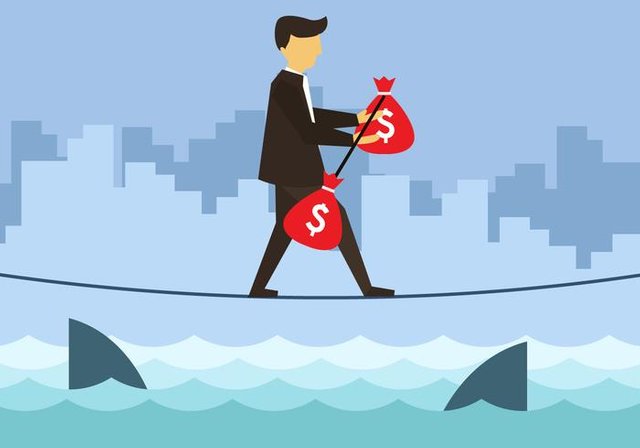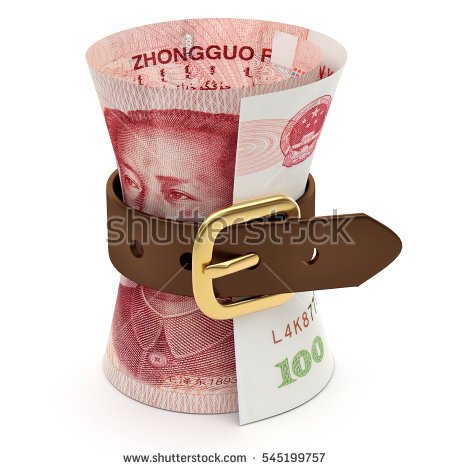Deleveraging in China: A Dangerous Walk on the Tightrope.
We are at a very interesting point in history. China, the worlds second largest economy and the defacto hegemonic power in the next century (according to many economists) is in the midst of addressing systemic banking problems and battling debt. Over the last decade China has increased its' debt to GDP ratio from about 140% to over 266%. A absolutely staggering increase in such a short span and one that hasn't been seen in history. Many Chinese officials and outside economists agree that China is addicted to debt. This contributes to instability and unsustainability in its economy. This debt threatens to derail and even retract progress if not handled perfectly.....and even then, it may not be enough.

Xi Jinping has consolidated power in recent years, installing himself at the head of every major government agency and casting aside political opponents with his anti corruption campaign. This anti corruption campaign has seen the discipline or removal of over 100,000 CPP (China Communist Party) officials and has seen businessmen jailed or executed for fraud. The verdict is still out on whether these moves have been simply power grabs or a necessary step to remove barriers so reform can progress. (Most likely a little of both). The reason reform has been so hard, has been the powers benefiting from the current system are resistant to change. The underpinnings of the entire economy hinge on debt and incentives for officials to show growth at any cost. Naturally, any directive to preform any action other that the former is often ignored. Force and fear may be the only way to over come that.

A Year of Contraction
During the mid point of 2017, Beijing started to crackdown seriously on shadow banking and credit issuance. ( Shadow banking is off the balance sheet banking activities banks were using to get around prior restrictions set forth by the government). It is estimated by Bloomburg that shadow banking is 10 trillion dollars large in China. One of the main conundrums and challenges facing reform in China, is that directives from Beijing are rarely followed. When the government implemented restrictions on banks lending, they turned to more shadow lending. This is because banks and provisional governments are required to meet certain thresholds in growth. Loans needed to be made and defaulted loans needed to be hidden. Beijing knew this of course, but real crackdown would mean growth would be hindered and could cascade into a ripple effect decimating the economy. So all institutions kept on lending, and lending, and even when loans couldn't be repaid, they simply issued new loans. When those loans rannout, they would issue "wealth management products that would be gobbled up by the public. Theses "products" offered a guaranteed ROI of 5-15% annually. Much of this is propped up by real estate, as prices have absolutely skyrocketed. Many in China can expect to pay 20 times their annual income for a home.
However, Xi it seems to have managed enough restrictions in lending to start what even China is calling "deleveraging"
Now deleveraging is a Keynesian economic term to refer to the time in the short or long term debt cycle that credit contracts, banks no longer hand out loans like candy, and those with high debt start to get squeezed. Many modern economists believe that when this phase of the economic cycle hits, it is the governments responsibility to step in to lower interest rates, or stimulate the economy. Here in lies the paradox that China faces right now.

photocredit shutterstock
Deleveraging retracts credit and makes acquiring new debt difficult. For businesses or entities with large amounts of debt, deleveraging squeezes out liquidity and the debt burden becomes too large, causing default.
Many defaults can create solvency issues in banks and municipalities, it can leach into every aspect of the economy bringing on a depression of crisis.
Here in lies the paradox that China faces right now.
- China has many....many bad loans. China's economy has been fueled by debt, yet now, China doesn't want to add more debt. Still, China wants to grow at the same pace it has been (6.7% GDP). It is commonly believed theses numbers are greatly fudged.
So how can an economy that is fueled by debt, that wants to stop issuing debt, but still wants the same growth exist? It can't, unless China can defy laws of economics.
Maybe it can. Many think China has defied the laws already.
A Precarious Year
Most of China's debt is corporate. In 2018, there have already been more corporate defaults then any year on record and many projects that China committed to abroad are suddenly having funding dry up. China has unparalleled control over its economy. It doesn't let money leave the country, it can order state run firms to buy stocks, so as to stabilize the market. It can inject money into banks and prolong unproductive or failing business indefinably. It can crack down on all dissidence and it can be almost impossible to get accurate figures about its finances. It can also fluctuate its currency to suit its economic advantage. All these tools equip it to deal with the deleveraging like no other country can, but something must give.
Recently China's credit has been down graded by Moody's' for the first time in three decades.
One of the Moves Few are Talking about
-Recently. China has slashed the fractional reserves banks must hold.
This means banks can hold less cash. They can dispense this extra liquidity to cover bad loans, or even issue new ones without contributing to an increase in debt. It is another precarious fiscal tightrope walk and emphasizes the strain on the Chinese economy right now. If Beijing needs a move like this, then things must be becoming tight money wise. They are willing to expose banks to a high chance of insolvency at just a hint of distrust or panic among the public. The government wouldn't be willing to do that unless they needed to. They needed to because mountains of bad loans are looming over banks and local municipalities and they need all the cash possible to stem the tide or risk a domino effect of defaults. Not just by corporations, but local governments, who have borrowed over two trillion for infrastructure spending over the last decade.
In my humble opinion, this is a glimpse at how dire the situation is right now in China. Things may seem calm and even rosy from the outside. China does a tremendous job at acting like everything is fine and all part of the plan, but I doubt the inner of the banking sector and CPP are as jubilant at their current condition. Chinese citizens are also unaware at the dark forces at work with their limited access to information and censorship upon any utterance of instability.
The government restricts free speech, movement, money, internet, entrepreneurship, and much else to such a degree that it succeeding in its efforts to overtake the U.S. in the next 20 years would be a major blow against liberty and freedom. I hope that doesn't happen. I hope the recent tariffs add to the precariousness of the situation and I hope the U.S. implements more measures to check China and expose some of the Ponzi-scheme economy they have built.

Very relevant post. I have covered this in my weekly synopsis as to how big the corporate default bubble is in China this year, and with a major energy company going bankrupt last week the PBOC is asking investors to by junk AA rated products. Seems like a Deja Vu of 2008.
I was thinking the same thing. Sounds like the temptations are in place to do what the USA did in the events leading up to the 2008 market crash.
Nice to meet you @diezeldiddy, very interesting article, it is noted that you studied the sources well. I wish that this does not happen and that justice is the one imposed in China, that God will guide them so that they do not become as we are here in Venezuela. Blessings.
Thank you! I did put in some time fact checking my sources. Yes, hopefully they do not fall into a deep debt crisis like your home. Very sorry about that